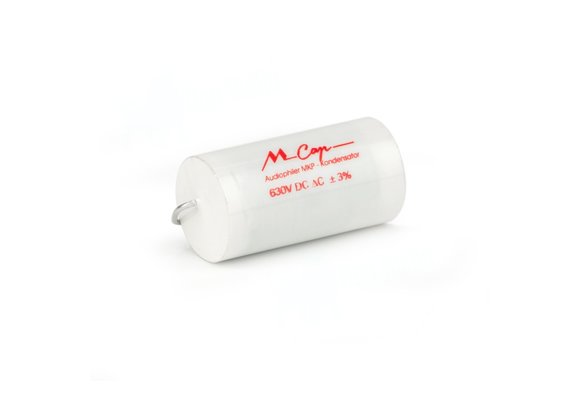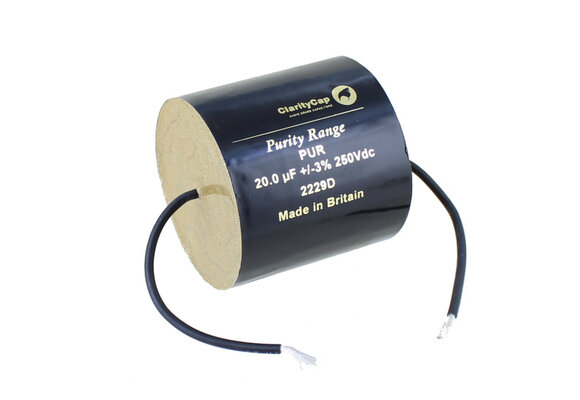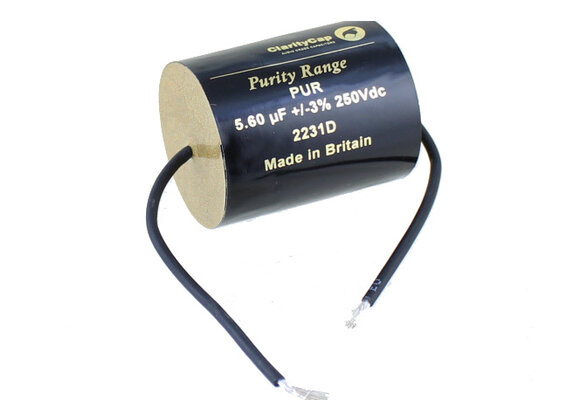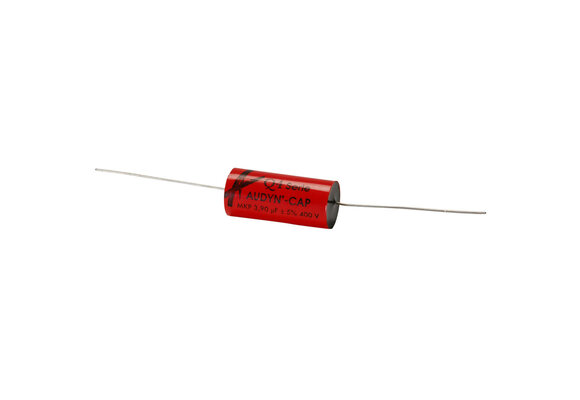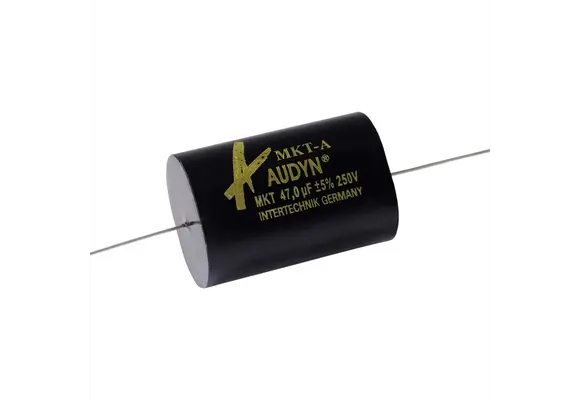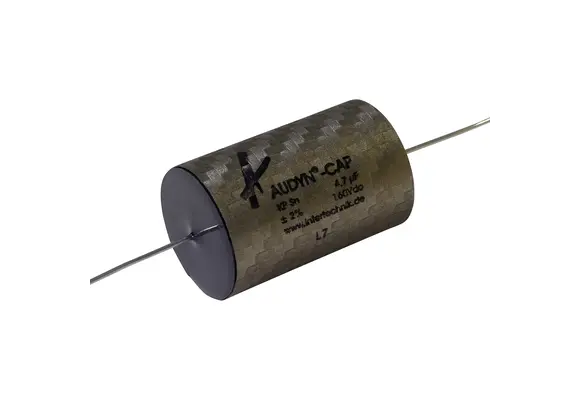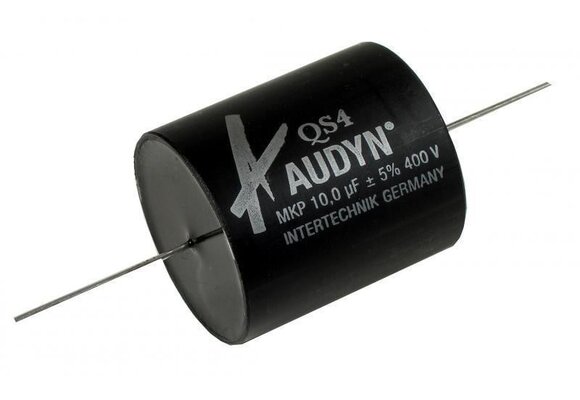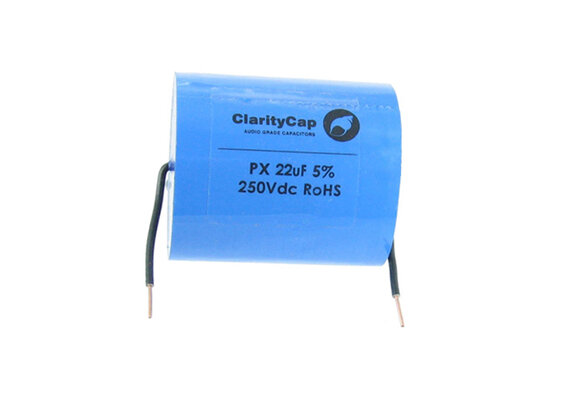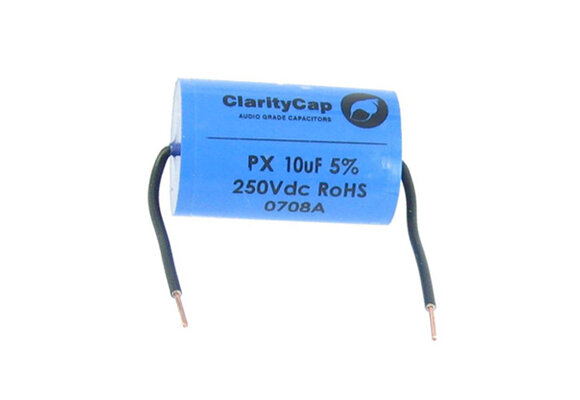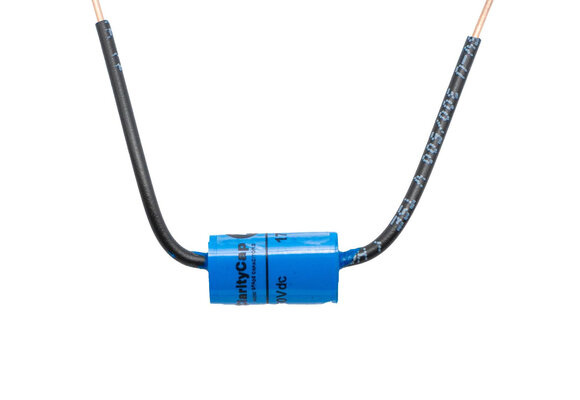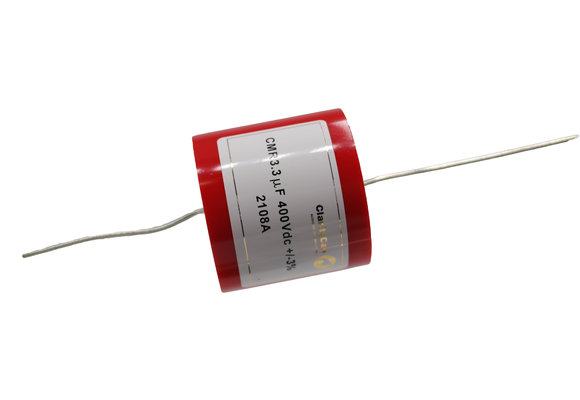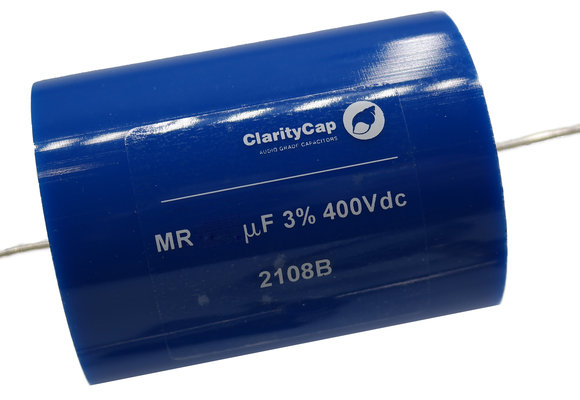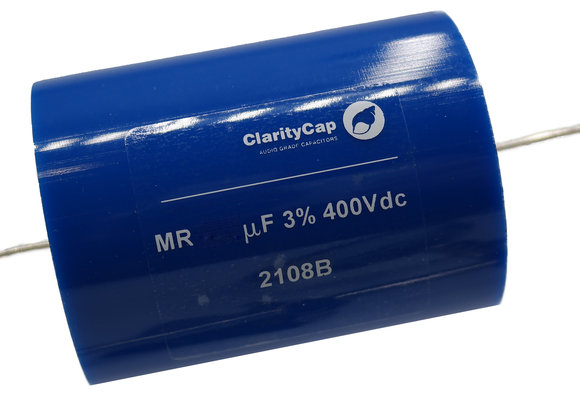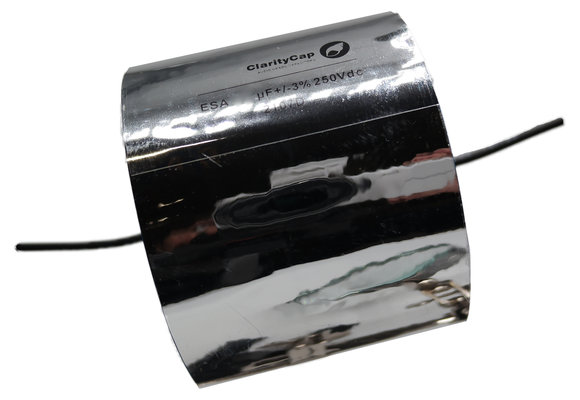What is a film/ foil capacitor?
A film/foil capacitor is a non-polarized capacitor. Its dielectric is made using a thin plastic film between two layers of electrodes made out of aluminium foil. In other terms, a film/foil capacitor is identical to a bipolar capacitor, just with a thin plastic film/foil as their dielectric. It can either be inductive or non-inductive. The film/foil capacitor is known and valued for its low distortion factor and its excellent frequency characteristics. Also, it comes with a high insulation resistance and good capacitance stability. However, the main advantage of film/foil capacitors is that their internal construction is their direct contact to the electrodes on both of the winding's ends, which keeps all currents paths short.
Here at SoundImports, you can buy film/foil capacitors from popular quality brands such as ClarityCap, Dayton Audio, Jantzen Audio and Mundorf!
What are film capacitors used for?
The film capacitor serves the same function as all other capacitors. They accommodate the electric charge. However, film capacitors are superior to other general capacitors in terms of efficiency due to their superior characteristics. Film and foil capacitors are known for high insulation resistance, low dielectric loss, no polarity and excellent frequency characteristics (wide frequency response).
How long do film capacitors last?
This question can not be answered with a specific number. There are capacitors installed in crossover boards that work for over 40 years, but there are also modern crossover boards where the capacitor fails after a couple of years. The lifetime gets influences by several factors, such as material quality, heat exposure, moisture exposure and intensity of use. However, in general, it can be said that a capacitor has an expected life expectancy of 10 – 15 years.
What is the difference between a capacitor and a battery?
Capacitors and batteries both are designed to store electrical energy, but they do so in different ways and are therefore used for different purposes. Capacitors store energy quickly and release it just as quickly through an electric field between conductive plates. This makes them suitable for applications where quick energy is needed. On the other hand, batteries store energy in the form of chemical energy, which is released more slowly, making them suitable for applications that require a prolonged energy supply. In terms of voltage, it remains relatively constant during use in batteries, while in capacitors, the voltage decreases as they discharge.
What is the difference between a film/foil capacitor and an electrolytic capacitor?
The main difference can be traced back to the type of dielectric used and its construction. The film/foil capacitors here at SoundImports are available in a wide range of capacitance values. Also, film/foil capacitors are more likely to resist ageing over time, making them the favoured choice for high-frequency applications such as speaker building.

 Home audio
Home audio  Audio components
Audio components  Crossover components
Crossover components  Test & measurement
Test & measurement  DIY kits
DIY kits  Accessories
Accessories  New products
New products  Home audio
Home audio  Audio components
Audio components  Crossover components
Crossover components  Test & measurement
Test & measurement  DIY kits
DIY kits  Accessories
Accessories  New products
New products  Speakers
Speakers Amplifiers
Amplifiers DAC converters
DAC converters DSP modules
DSP modules Turntables
Turntables Streamers
Streamers Woofers
Woofers Tweeters
Tweeters Exciters
Exciters Bass shakers
Bass shakers Plate amplifiers
Plate amplifiers Amplifier modules
Amplifier modules Single board computers
Single board computers Assembled crossovers
Assembled crossovers Printed Circuit Boards (PCB)
Printed Circuit Boards (PCB) Capacitors
Capacitors Resistors
Resistors Coils
Coils Circuit Breakers
Circuit Breakers Crossover tools
Crossover tools Screw terminals
Screw terminals Acoustic measurements
Acoustic measurements Electric measurements
Electric measurements Sound level meters
Sound level meters DIY amplifier kits
DIY amplifier kits DIY component packs
DIY component packs DIY speaker kit
DIY speaker kit DIY subwoofer kits
DIY subwoofer kits DIY bluetooth speaker
DIY bluetooth speaker DIY electronics kits
DIY electronics kits Binding posts
Binding posts Cabinet Hardware
Cabinet Hardware Cables
Cables Connectors
Connectors Speaker cabinets
Speaker cabinets Electromechanics
Electromechanics Power supplies
Power supplies Speaker repair
Speaker repair Workshop & tools
Workshop & tools Amplifier accessories
Amplifier accessories Stands & mounts
Stands & mounts Gift voucher
Gift voucher Books
Books New products
New products









 Speakers
Speakers Amplifiers
Amplifiers DAC converters
DAC converters DSP modules
DSP modules Turntables
Turntables Streamers
Streamers Woofers
Woofers Tweeters
Tweeters Exciters
Exciters Bass shakers
Bass shakers Plate amplifiers
Plate amplifiers Amplifier modules
Amplifier modules Single board computers
Single board computers Assembled crossovers
Assembled crossovers Printed Circuit Boards (PCB)
Printed Circuit Boards (PCB) Capacitors
Capacitors Resistors
Resistors Coils
Coils Circuit Breakers
Circuit Breakers Crossover tools
Crossover tools Screw terminals
Screw terminals Acoustic measurements
Acoustic measurements Electric measurements
Electric measurements Sound level meters
Sound level meters DIY amplifier kits
DIY amplifier kits DIY component packs
DIY component packs DIY speaker kit
DIY speaker kit DIY subwoofer kits
DIY subwoofer kits DIY bluetooth speaker
DIY bluetooth speaker DIY electronics kits
DIY electronics kits Binding posts
Binding posts Cabinet Hardware
Cabinet Hardware Cables
Cables Connectors
Connectors Speaker cabinets
Speaker cabinets Electromechanics
Electromechanics Power supplies
Power supplies Speaker repair
Speaker repair Workshop & tools
Workshop & tools Amplifier accessories
Amplifier accessories Stands & mounts
Stands & mounts Gift voucher
Gift voucher Books
Books New products
New products
